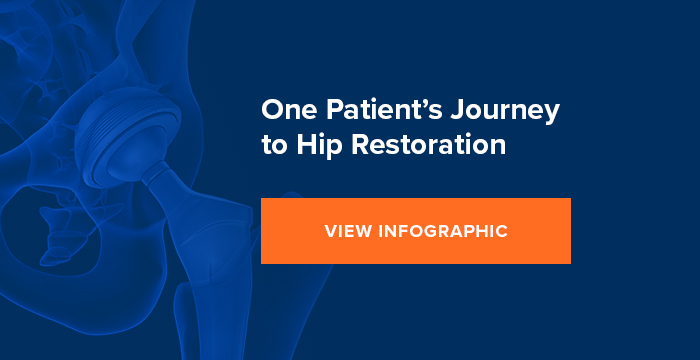
At EmergeOrtho—Triangle Region our mission is to help patients Emerge Stronger. Healthier. Better. This means offering comprehensive, patient-focused orthopedic care. It also means that our physicians and surgeons effectively utilize advanced treatment and surgical approaches. In doing so, our patients benefit by experiencing reduced recovery periods, less pain, and a more rapid return to the activities they enjoy!
Anterior hip replacement is a perfect example of how EmergeOrtho Hip and Joint Replacement Surgeons encourage improved mobility and quality of life for our active patients. Whether you are an avid golfer, runner, horseback rider, or weekend warrior, it is our goal to see you back on the greens, trails, and other North Carolina spaces and places.
Signs You Need a Hip Replacement
When patients come to us with hip pain, symptoms of hip arthritis, and are unable to move freely without discomfort, our hip team works together to find a personalized solution. If conservative treatment methods such as physical therapy, medication, and activity modification have failed to resolve symptoms, anterior hip replacement may be suggested.
The best candidate for anterior hip replacement is someone with:
- Hip pain (usually felt in the buttock and groin)
- Pain that results in more bad days than good days
- Pain and discomfort that prevents activities
- Health that is in good condition (medical problems are under control, especially diabetes, no smoking, off blood thinners, appropriate weight according to body type)
Benefits of Anterior Hip Replacement
Anterior hip replacement allows for what we refer to in the orthopedic world as “a muscle-sparing approach.” Essentially, rather than having to detach the muscle from the pelvis or femur as is necessary during traditional hip replacement surgery, anterior hip replacement allows access through the natural space between the pelvic muscles.
 “There are now implants available that have been optimized for use with the anterior approach,” says EmergeOrtho’s Dr. Ralph Liebelt. “The ‘fit’ is optimal for long term bone fixation with good stress transmission to the femur so that it maintains its strength.”
“There are now implants available that have been optimized for use with the anterior approach,” says EmergeOrtho’s Dr. Ralph Liebelt. “The ‘fit’ is optimal for long term bone fixation with good stress transmission to the femur so that it maintains its strength.”
Additional benefits of this less-invasive muscle-sparing approach include:
- Reduced hospital stay after surgery
- Faster recovery and return to favorite activities
- Less muscle trauma and pain
- Improved outcomes concerning future hip injuries (dislocation)
- Fewer to no postoperative restrictions
- Reduced scarring (only a four to five-inch incision is required)
- Overall improved patient satisfaction
How Long Does Hip Replacement Surgery Take?
One of the most common questions our hip surgeons receive is how long is hip replacement surgery? Anterior hip replacement takes about one hour to one hour and 30 minutes, which is similar to traditional hip replacement.
Initial Healing After Anterior Hip Replacement
“Approximately one-third of my patients leave the hospital the day of surgery,” says Dr. Deren Bagsby, EmergeOrtho Hip specialist, performing upwards of 400 anterior hip surgeries annually. “With the other two-thirds leaving the following day.”
Patients are immediately able to bear weight on the hip following anterior hip replacement and have no restrictions in range-of-motion. Typically, the use of a walker is recommended, followed by a cane, for approximately two weeks.
Many people are able to discontinue pain medicine by week two and resume normal activities around two to three months, without even thinking about their hip!
“Even though many patients feel better very quickly, it is very important to not resume any impact loading activities too soon,” Dr. Liebelt says. “Excessive loads could prevent the boney fixation to the implants required for long term stability. Your surgeon will help guide you about the return to activities other than walking and simple activities.”
Maximizing Recovery From Anterior Hip Replacement
A safe and rapid recovery after hip replacement is strongly dependent upon how diligently a patient follows post-surgery guidelines and therapy requirements. Consistently participating in therapy exercises is one of the most crucial aspects of positive hip replacement surgery outcomes. The great thing about hip replacement therapy is that it mostly just involves walking.
Many times, our EmergeOrtho hip surgeons will suggest patients see a physical therapist once or twice a week for the first few weeks to ensure they are making appropriate progress.

The EmergeOrtho—Triangle Difference
Collectively, our Triangle Region Hip team has performed thousands of successful hip replacement surgeries. Our fellowship-trained, board-certified EmergeOrtho physicians and surgeons have the expertise, compassion, and world-class care that North Carolina residents rely upon.
To learn more, self-schedule an appointment now. Or, call us any time at (919) 220-5255.







